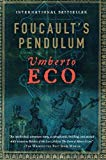
Most books written in this genre seem to focus on the mysterious, and aim to provide their own version of the conspiracy theory. Eco avoids this pitfall without holding back on the historical mystery surrounding the Knights Templar. In fact, the novel may be viewed as a critique, spoof, or deconstruction of the grand overarching conspiracies often found in postmodern literature. Although the main plot does detail a conspiratorial "Plan", the book focuses on the development of the characters, and their slow transition from skeptical editors, mocking the Manutius manuscripts to credulous Diabolicals themselves. In this way the conspiracy theory provided is a plot device, rather than an earnest proposition.
Belbo's writings are a recurrent theme throughout the book. The entire book is narrated in first person by Casaubon, with brief interludes from the files on Abulafia. These passages are often eccentrically written, and deal in most part with Belbo's childhood, his constant sense of failure, and his obsession with Lorenza. The interludes from his childhood serve as stark contrast to the mythical world of cults and conspiracies. Belbo is extremely careful to not try to create (literature), because he deems himself unworthy, although it becomes somewhat obvious that writing is his passion. This attitude of constant subconscious self-abasement fits in with the overall irony focused on in the book, considering that Belbo is eventually consumed by (re)creation of the Plan.
Casaubon is a scholar. While Belbo seeks inner peace, Casaubon's quest is of knowledge. The uncertainty of scientific knowledge and human experience is explored in his character, as he participates in various extra-natural events. His narratives abandon his strict realism and become increasingly inclined towards the supernatural as the novel progresses.
Mr. Garamond, whose primary business is selling dreams (through his vanity press outlet), comes to believe the fantasy world his authors weave. It is possible though, that he had always been a "Diabolical", and founded his publishing business to fish for information.
The following are some of the secret and not-so-secret groups that appear in Foucault's Pendulum :
The following are actually not involved with the Plan:
Already have an account? Log In Now